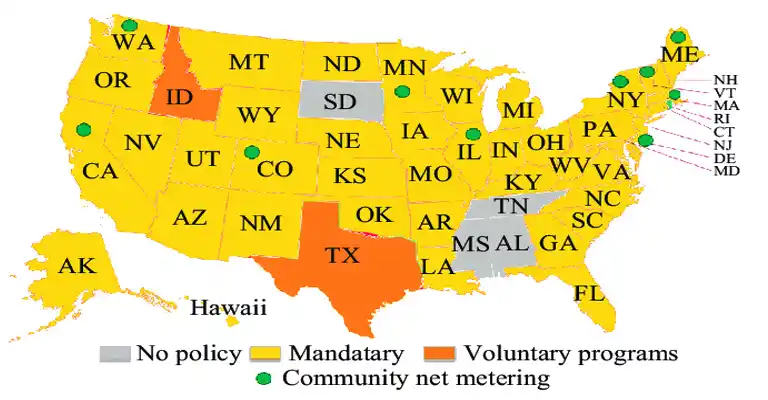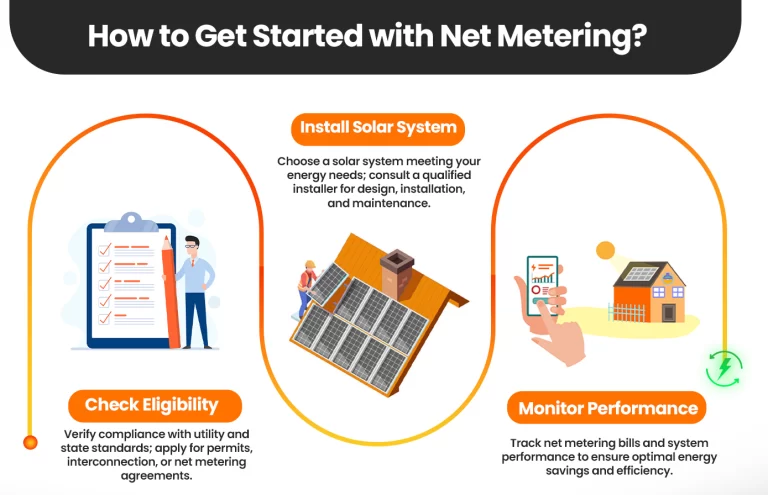- Updated On: June 02, 2025
Net Metering: Everything A Homeowner
Needs to Know
Low energy bills and power independence are the compelling reasons for switching to solar power. However, when you learn more about solar energy, you will find out another top benefit of a home solar system: you can sell any excess energy your panels produce, back to the utility company through net metering. In return, you will get energy credits. You can utilize these credits when it’s cloudy or at night to lower energy bills.

However, state and local laws, utility company policies, and other factors affect net metering. If you live in a state where NEM is available, you will be able to sell extra electricity to the utility company. Let’s learn more about solar net metering, how it works and explore the states where it is available.
What is net metering?
Net metering is also known as net energy metering (or NEM). It is a process that allows homeowners to send extra energy generated by their solar panels system to the electrical grid. However, the common misconception is that you will earn money for excess energy. That’s not exactly true. You will unlikely receive a check from the electric company if you provide them with electricity. Instead, when you use electricity, your electric meter will track power and it will get the balance when you send power back to the grid. As a result, the cost of electricity is reduced or sometimes eliminated.
How does net energy metering work?
Net metering allows you to receive credits for the solar energy you send back to the grid. Also, it offsets the cost of electricity you will purchase from the utility during night or cloudy days. It allows you to receive the full economic value of all the solar power your panels produce. If you have a well sized PV solar system in your home, you can even eliminate your monthly electric bills. Learn how to read your solar electric bill.
Your rooftop solar sends its excess power to the grid when it generates more electricity than it needs. Your electricity meter rotates backward, and your utility applies credit for the full retail value of electricity to your account when a net-metered system sends energy to the grid.

However, when your solar panels aren’t producing much energy during the night or in winters, you consume power from the grid. This usage causes your electric meter to spin once more. The phrase “net metering” refers to a billing method by which the utility calculates your final bill by balancing the electricity you use and sending it to the grid.
How do electricity bills work with net metering?
In general, most households generate excess power in the summer months and consume more electricity from the grid in the winter. These swings in output are pretty predictable, your utility won’t send you a monthly bill when you produce more than you need. Rather, during the summer you will accumulate more credits that you can use at night and in the winter when you need them. Even if you produce significantly more electricity than you use in some months and significantly less in others, a well-sized rooftop energy system can provide enough power to cover your annual electricity consumption.
Do net metering credits carry over month to month?
Depending on the utility, you can use your energy credits over month to month in full-retail net metering programs. These credits are to offset the electricity bill you need from the grid next month. On average, during the summer, when the days are long and sunny, you have the opportunity to earn extra credits. You can use these summer credits to lower your electrical bills during the gloomy winter months.
Is NEM available in all states and cities in the U.S.?
Out of the 50 states, 28 mandate full-retail net metering. While 18 states provide some alternate net metering tariffs or programs like solar buyback plans. Utility companies have been pushing to restrict such programs across the U.S. to minimize residential customers’ solar savings and boost their profit margins. In areas like Louisiana and South Carolina, utilities have been successful.

What are the challenges to NEM?
Despite its advantages, net metering weakens the traditional utility paradigm by modifying the dynamics between power consumers and utilities. The cost-benefit evaluations were carried out in many states and they stated that the net metering cost exceeds the total benefit to big utility companies. Moreover, utility lobbyists are still opposing this solar-friendly strategy. The California Public Utilities Commission (CPUC) passed NEM 3.0, which benefits large utilities, after nearly 2 years of contentious debates. Although modernizing the grid is the goal, they do so at the expense of rooftop solar. California’s new net billing approach puts the value of solar panels at risk, unless a battery is installed or the system size is cut in half, as it devalues exported solar power by 75%.
On the other coast, the biggest American electricity company, Florida Light & Power, is still pushing for net energy metering regulatory changes. Florida Governor Ron DeSantis vetoed a bill that would have allowed public utilities like FL&P to charge solar consumers more to make up for lost revenue, which was a victory for the solar sector. The battle isn’t over, though.
How to get started with net metering?
If net metering is available in your state, you must first confirm your eligibility and compliance with your utility provider and your state’s or municipality’s standards. A permit, interconnection agreement, or net metering contract may all need to be applied for. Additionally, you might need to abide by specific standards, codes, or inspections.

The second step is to install a solar power system that meets both your budget and your energy requirements. If you need assistance with the design, installation, or maintenance of your PV system, you should speak with a qualified solar installer like Solar SME. Third, you must keep an eye on and manage your net metering billing and performance.
Overall, net energy metering, a state solar incentive, allows you to save on your electric bills when you use grid power and maximize your savings. If you live in a qualified state, you can achieve high ROI and shorter solar payback period with solar programs like federal tax credit, solar net metering or state rebates. Hence, installing a solar panel system is a worthy investment bringing along lots of perks alongside low electric bills and grid independence. However, as policy changes frequently nowadays, you should plan your solar installation as soon as possible to qualify for all the solar incentives in your area.
Solar SME is a local solar installer near you, offering affordable and tailored solar solutions. We will guide you with all the solar rebates in your area to minimize the upfront cost of solar. Get a FREE Quote for your solar savings with our smart solar calculator!
Related Articles:
One of America’s most effective solar incentives is net metering. It has driven the growth of residential solar with laws in over 40 states and U.S. territories.
Solar energy is becoming popular across the U.S. as homeowners and businesses seek ways to lower their energy costs and reduce grid resilience.
Choosing a solar panel system for your home, you’ll typically encounter two main options: off-grid and on-grid (also known as grid-tied) solar systems.



